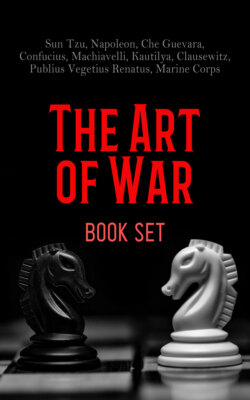Читать книгу The Art of War - Book Set - Carl von Clausewitz - Страница 107
На сайте Литреса книга снята с продажи.
CHAPTER XXI. THE SUPERINTENDENT OF TOLLS.
ОглавлениеTable of Contents
THE Superintendent of Tolls shall erect near the large gate of the city both the toll-house and its flag facing either the north or the south. When merchants with their merchandise arrive at the toll-gate, four or five collectors shall take down who the merchants are, whence they come, what amount of merchandise they have brought and where for the first time the sealmark (abhijnánamudrá) has been made (on the merchandise).
Those whose merchandise has not been stamped with sealmark shall pay twice the amount of toll. For counterfeit seal they shall pay eight times the toll. If the sealmark is effaced or torn, (the merchants in question) shall be compelled to stand in ghatikásthána. When one kind of seal is used for another or when one kind of merchandise has been otherwise named (námakrite), the merchants shall pay a fine of 1¼ panás for each load (sapádapanikam vahanam dápayet).
The merchandise being placed near the flag of the toll-house, the merchants shall declare its quantity and price, cry out thrice "who will purchase this quantity of merchandise for this amount of price," and hand over the same to those who demand it (for that price). When purchasers happen to bid for it, the enhanced amount of the price together with the toll on the merchandise shall be paid into the king's treasury. When under the fear of having to pay a heavy toll, the quantity or the price of merchandise is lowered, the excess shall be taken by the king or the merchants shall be made to pay eight times the toll. The same punishment shall be imposed when the price of the merchandise packed in bags is lowered by showing an inferior sort as its sample or when valuable merchandise is covered over with a layer of an inferior one.
When under the fear of bidders (enhancing the price), the price of any merchandise is increased beyond its proper value, the king shall receive the enhanced amount or twice the amount of toll on it. The same punishment or eight times the amount of toll shall be imposed on the Superintendent of tolls if he conceals (merchandise).
Hence commodities shall be sold only after they are precisely weighed, measured, or numbered.
With regard to inferior commodities as well as those which are to be let off free of toll, the amount of toll due shall be determined after careful consideration.
Those merchants who pass beyond the flag of the toll-house without paying the toll shall be fined eight times the amount of the toll due from them.
Those who pass by to and from (the city) shall ascertain (whether or not toll has been paid on any merchandise going along the road.)
Commodities intended for marriages, or taken by a bride from her parents' house to her husband's (anváyanam), or intended for presentation, or taken for the purpose of sacrificial performance, confinement of women, worship of gods, ceremony of tonsure, investiture of sacred thread, gift of cows (godána, made before marriage), any religious rite, consecration ceremony (dikshá), and other special ceremonials shall be let off free of toll.
Those who utter a lie shall be punished as thieves.
Those who smuggle a part of merchandise on which toll has not been paid with that on which toll has been paid as well as those who, with a view to smuggle with one pass a second portion of merchandise, put it along with the stamped merchandise after breaking open the bag shall forfeit the smuggled quantity and pay as much fine as is equal to the quantity so smuggled.
He who, falsely swearing by cowdung, smuggles merchandise, shall be punished with the highest amercement.
When a person imports such forbidden articles as weapons (sastra), mail armour, metals, chariots, precious stones, grains and cattle, he shall not only be punished as laid down elsewhere, but also be made to forfeit his merchandise. When any of such commodities has been brought in for sale, they shall be sold, free of toll far outside (the fort).
The officer in charge of boundaries (antapála) shall receive a pana-and-a-quarter as roadcess (vartani) on each load of merchandise (panyavahanasya).
He shall levy a pana on a single-hoofed animal, half a pana on each head of cattle, and a quarter on a minor quadruped.
He shall also receive a másha on a head-load of merchandise.
He shall also make good whatever has been lost by merchants (in the part of the country under his charge).
After carefully examining foreign commodities as to their superior or inferior quality and stamping them with his seal, he shall send the same to the superintendent of tolls.
Or he may send to the king a spy in the guise of a trader with information as to the quantity and quality of the merchandise. (Having received this information,) the king shall in turn send it to the superintendent of tolls in view of exhibiting the king's omniscient power. The superintendent shall tell the merchants (in question) that such and such a merchant has brought such and such amount of superior or inferior merchandise, which none can possibly hide, and that that information is due to the omniscient power of the king.
For hiding inferior commodities, eight times the amount of toll shall be imposed; and for hiding or concealing superior commodities, they shall be wholly confiscated.
Whatever causes harm or is useless to the country shall be shut out; and whatever is of immense good as well as seeds not easily available shall be let in free of toll.
[Thus ends Chapter XXI, “The Superintendent of Tolls” in Book II, “The Duties of Government Superintendents” of the Arthasástra of Kautilya. End of the forty-second chapter from the beginning.)
